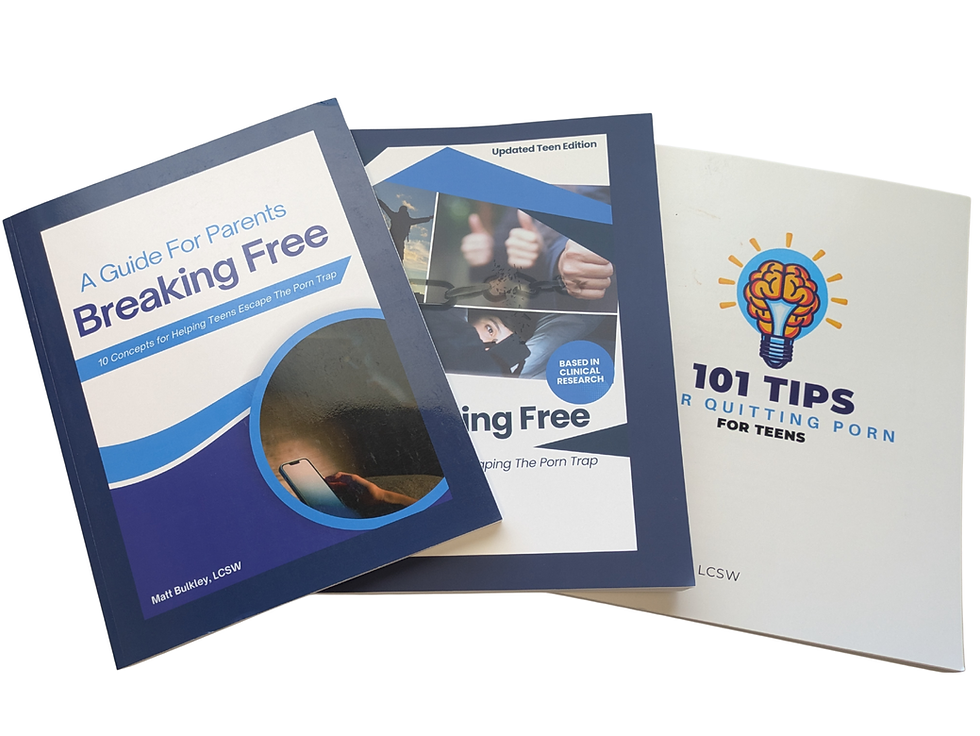Helping Your Teen Break Free from Pornography Addiction: The Power of Daily Exercise
- Matt Bulkley

- Jun 15
- 4 min read
Updated: Jun 18
As parents, watching your teen struggle with pornography addiction can feel overwhelming. You want to help them find a path to freedom, but where do you start? One surprisingly effective strategy is encouraging daily exercise—whether it’s push-ups, running, or playing a sport. Exercise isn’t just about physical health; it’s a powerful tool to support your teen’s mental and emotional recovery. Let’s explore why daily movement can be a game-changer for teens working to overcome pornography addiction, backed by science and practical insights.
Why Exercise Matters for Your Teen
Pornography addiction can take a toll on your teen’s brain, emotions, and self-esteem. It’s often driven by a cycle of seeking quick dopamine hits—the brain’s “feel-good” chemical—through repeated exposure to explicit content. Over time, this can rewire their brain, making it harder to find joy in healthier activities. Stress, boredom, and low self-worth can also fuel the habit, creating a vicious cycle.
Daily exercise offers a natural, healthy way to break this cycle. Here’s how it works and why it’s so effective for teens:
Rewires the Brain for Healthy Rewards
A 2021 study in the Journal of Behavioral Addictions highlights that regular exercise boosts dopamine levels naturally, mimicking the “high” that pornography provides but without the harmful side effects. Activities like running, lifting weights, or playing soccer can help your teen’s brain rediscover joy in positive, sustainable ways. Over time, this can reduce their reliance on pornography for a quick fix, helping them feel more in control.
Reduces Stress and Cravings
Stress is a major trigger for pornography use, especially for teens navigating school, social pressures, or family challenges. According to a 2019 study in Psychophysiology, daily physical activity lowers stress hormones and promotes relaxation. Exercise acts like a reset button for the nervous system, helping teens manage stress without turning to unhealthy coping mechanisms. Many teens in recovery report that regular workouts weaken the urge to view pornography, as their body learns to crave the natural “runner’s high” instead.
Replaces Bad Habits with Good Ones
A 2020 study in Addictive Behaviors found that individuals who exercised daily were less likely to relapse into old habits, including pornography use. Exercise fills time that might otherwise be spent scrolling online, reducing boredom and temptation. It also creates a new routine, giving your teen a sense of purpose and accomplishment. Whether it’s mastering a new skill in a sport or hitting a personal best in the gym, these achievements build momentum for positive change.
Boosts Confidence and Self-Esteem
Pornography addiction can erode a teen’s self-worth, leaving them feeling ashamed or disconnected. A 2022 study in Sexual Addiction & Compulsivity noted that daily exercise helps teens in recovery rebuild their confidence. Physical activity improves sleep, sharpens focus, and fosters a sense of pride in their accomplishments. Whether it’s nailing a new skateboard trick or finishing a tough workout, these wins help your teen feel stronger—mentally and physically.
How to Encourage Your Teen to Get Moving
Introducing exercise as part of your teen’s recovery journey doesn’t have to feel like a chore. Here are some practical tips to help them embrace daily movement:
Find What They Love: Not every teen is into running or team sports. Explore options like dance, martial arts, yoga, or even skateboarding. Let them choose an activity that feels fun and engaging. If they enjoy it, they’re more likely to stick with it.
Start Small: If your teen isn’t used to exercising, encourage them to start with something simple, like a 10-minute walk, a few push-ups, or a quick bike ride. Small steps build consistency, which is key to long-term success.
Make It Social: Exercise can be a great way for your teen to connect with friends or meet new people. Suggest group activities like a pickup basketball game, a hiking club, or a fitness class. Positive peer support can reinforce their commitment to recovery.
Celebrate Progress: Acknowledge their efforts, whether it’s completing a workout or trying a new sport. Positive reinforcement boosts their motivation and helps them see exercise as a rewarding part of their day.
Model Healthy Habits: If possible, join them in physical activities. Go for a family hike, try a workout video together, or play a game of tennis. Your involvement shows them that exercise is a normal, valuable part of life.
Supporting Your Teen’s Journey
While exercise is a powerful tool, it’s most effective when paired with other strategies, like open communication, professional support, or counseling. Pornography addiction can be complex, so consider connecting with a therapist who specializes in addiction to guide your teen. Encourage them to talk about their feelings and challenges, and let them know you’re there to support them without judgment.
You might also explore resources like support groups or online communities for teens in recovery. These can provide additional encouragement and accountability. If your teen is hesitant to open up, exercise can be a low-pressure way to start building healthier habits while you work on addressing the root causes together.
A Step Toward a Brighter Future
Helping your teen overcome pornography addiction is a journey, but daily exercise can be a powerful step forward. It’s more than just a physical activity—it’s a way to heal their brain, manage stress, build confidence, and replace harmful habits with positive ones. By encouraging your teen to get moving, you’re giving them a tool to take control of their recovery and rediscover their strength.
So, why not start today? Help your teen lace up their sneakers, pick an activity they enjoy, and take that first step toward a healthier, happier future. You’ve got this—and so do they.
Resources for Parents
For more information on supporting your teen, check out resources like Focus on the Family , Covenant Eyes and our Teen Recovery Toolbox which offer guidance on addressing pornography addiction.

Tips for Overcoming Pornography Addiction: Exercise









Comments